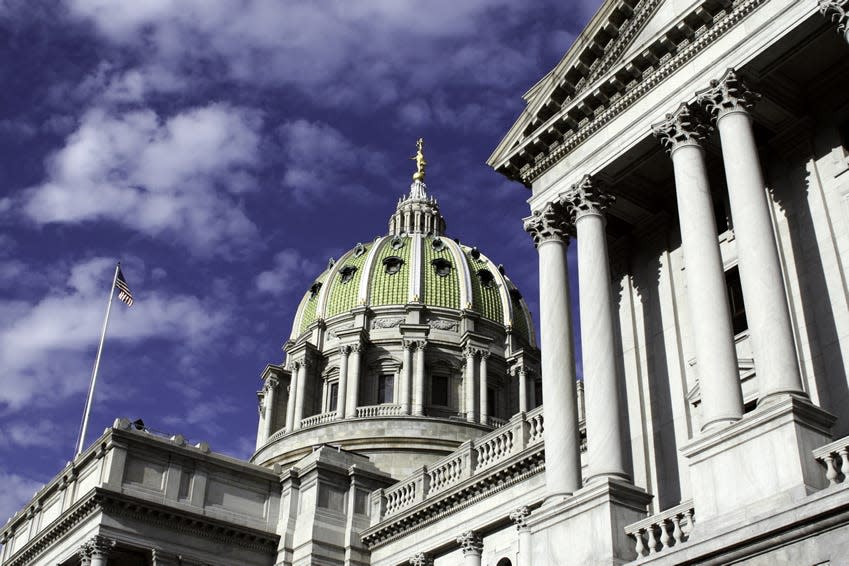No single person should have unchecked authority in Pennsylvania government | Opinion
The Pennsylvania Senate recently passed Senate Bill 1, which moves three proposed constitutional amendments closer to the ballot. Before Pennsylvanians can vote on the amendments, the proposals must pass the State House of Representatives.
But Democratic leadership and Speaker of the House Mark Rozzi are trying to keep a House vote from ever happening — effectually denying Pennsylvanians their voice.
Lawmakers owe their constituents the opportunity to vote on the amendments. One of these — initially sponsored by Sen. Ryan Aument, R-36 — would give the General Assembly the ability to review and reject a proposed regulation with a majority vote. This amendment would prevent one government official or unelected bureaucrats from unilaterally enacting sweeping regulation without the consent of the people’s elected representatives.

In our democratic system, no single individual should have unchecked authority to rule.
The regulatory review amendment is a commonsense proposal in line with the principles of balanced government, and one necessary to restore a balance of power in Harrisburg.
Gov. Josh Shapiro’s predecessor, Gov. Tom Wolf, frequently blurred the lines between the executive and legislative branches throughout his two terms in office. Wolf vetoed 65 pieces of legislation — more than the preceding four governors combined. And when he could not achieve his desired policies through the prescribed course of working with the state legislature, Wolf sought to circumvent them and impose his policies through executive orders and regulations.
Last year, Wolf unveiled — and sought to unilaterally impose — a slew of onerous charter school regulations designed to prevent the creation of new charter schools. Thousands of students seeking better educational opportunity are on Philadelphia charter school waiting lists, but the former governor’s regulations would have made it difficult — if not impossible — for charter schools to open.
The previous year, the Wolf administration finalized a regulation with new wage mandates, which would have harmed businesses already struggling to fill jobs. Moreover, charitable organizations, like the YMCA and Operation Smile, predicted services would suffer from the regulation’s prohibitive costs — forcing layoffs or reduced hours for employees.
Thankfully, budget agreements blocked these regulations, but in other instances, the governor was able to bypass the legislature.
Wolf unilaterally pushed Pennsylvania’s membership into the Regional Greenhouse Gas Initiative), a major multi-state agreement that imposes a tax on carbon production. While Pennsylvanians have already experienced soaring energy prices, expectations see RGGI raising electricity bills by another 24% to 36%.
Wolf’s decision to join the carbon tax program met bipartisan opposition in the General Assembly, but the former governor quickly vetoed their disapproval to forge ahead with his plans. And an attempt to override his veto fell one vote short in the Senate. Now the fate of Pennsylvania’s energy industry is in the hands of the courts.
Governors have the duty to enforce the law, not make law. The regulatory system was never meant to be an avenue for unchecked power.
Yet, Wolf’s mired legacy leaves a tilted precedent Democrats are all too happy to let continue while Republicans hold the majority in the Senate and control of the House is split. But no governor or state bureaucrat — Republican or Democrat — should have the power to act unilaterally and undermine our commonwealth’s balance of power.
Legislatures in most states already have some mechanism for the meaningful oversight of state regulations, and Pennsylvania should be no different. The regulatory amendment included in SB 1 would remove the governor’s ability to veto a measure of disapproval against his own regulations and move greater regulatory review authority closer to the people.
By ensuring no unelected state bureaucrat or “lone wolf” governor can make sweeping changes, the amendment will curb excessive power, force the executive and legislative branches to work together, and ensure that voters—who elect members of the legislature every two years—have greater influence over the regulations placed upon them by the government.
Now that SB 1 has passed the Senate, it’s time for our House of Representatives to follow suit. Voters deserve their say on this commonsense reform.
Kevin Kane is a senior government affairs specialist at the Commonwealth Foundation, Pennsylvania’s free-market think tank.
This article originally appeared on Bucks County Courier Times: No single person should have unchecked authority in Pennsylvania government

